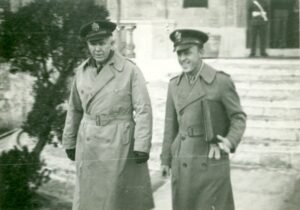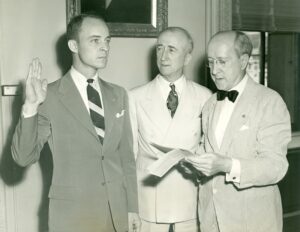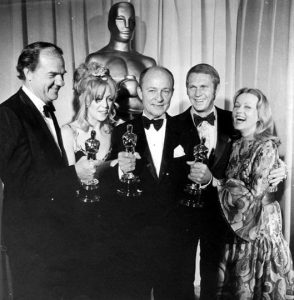 Frank McCarthy was born in Richmond, Virginia in 1912. After graduating from VMI in 1933, McCarthy returned to his alma mater as an instructor and then remained as alumni secretary. In the late 1930s, when Brother Rat, a comedy based rather loosely on life at VMI, became a Broadway success and a popular road show, he served for two years as a press agent for George Abbott productions in New York. When the play was made into a movie, with Ronald Reagan in one of the leading roles, McCarthy began a connection with Hollywood that was to lead to a postwar career in public relations and movie production. After the war began in Europe, he entered graduate school at the University of Virginia and received his master’s degree at the famous commencement ceremony where President Roosevelt delivered his impassioned attack on Mussolini for sticking a dagger in the back of defeated France.
Frank McCarthy was born in Richmond, Virginia in 1912. After graduating from VMI in 1933, McCarthy returned to his alma mater as an instructor and then remained as alumni secretary. In the late 1930s, when Brother Rat, a comedy based rather loosely on life at VMI, became a Broadway success and a popular road show, he served for two years as a press agent for George Abbott productions in New York. When the play was made into a movie, with Ronald Reagan in one of the leading roles, McCarthy began a connection with Hollywood that was to lead to a postwar career in public relations and movie production. After the war began in Europe, he entered graduate school at the University of Virginia and received his master’s degree at the famous commencement ceremony where President Roosevelt delivered his impassioned attack on Mussolini for sticking a dagger in the back of defeated France.
In 1940 he joined the War Department General Staff. There he served as Assistant Secretary and later Secretary of the General Staff, and also secretary to the Chief of Staff, General George C. Marshall. In the early fall of 1941, when General Marshall read that the VMI football team was to play in Washington he wondered if it was still possible to get a ticket for the game. Marshall pressed the buzzer for McCarthy and asked him to check on the matter. The young officer at once called the visiting coach, who promptly produced a ticket on the fifty-yard line. “Is the team so bad,” Marshall asked, “that no one is going to the game?” When McCarthy explained how his VMI background had helped, the Chief of Staff suggested he get another ticket and cheer with him for the cadets.
 Shortly after the end of the war, President Truman named McCarthy Assistant Secretary of State for Administration under United States Secretary of State James F. Byrnes. Only 33 years old at the time, McCarthy is thus the youngest Assistant Secretary of State in United States history. In 1946 McCarthy left the War Department and accepted the position of assistant to the president of Motion Picture Association of America in Hollywood.
Shortly after the end of the war, President Truman named McCarthy Assistant Secretary of State for Administration under United States Secretary of State James F. Byrnes. Only 33 years old at the time, McCarthy is thus the youngest Assistant Secretary of State in United States history. In 1946 McCarthy left the War Department and accepted the position of assistant to the president of Motion Picture Association of America in Hollywood.
McCarthy spent nearly twenty years working on a biographical film of General George S. Patton. This film won the Academy Award for Best Picture with McCarthy, as the film’s producer, accepting the award. From 1949 to 1962 he served as a producer at 20th Century Fox Studios and later at Universal Studios. During his career he produced Decision Before Dawn, Sailor of the King, A Guide for the Married Man, and Fireball Forward. In 1977, he produced the film MacArthur, an account of General Douglas MacArthur’s life from 1942 to 1952 starring Gregory Peck.
McCarthy maintained a steady connection to the Marshalls. He wrote and visited frequently. Immensely proud of his mentor, McCarthy kept newspaper articles, mementos from time in Marshall’s service, and personal letters from General and Mrs. Marshall. In his love for “Dear Frank,” Marshall wrote with warmth and feeling uncharacteristic of the reputedly detached general. One such letter was from 1946. Marshall wrote to McCarthy, “Some one, Shepley, I believe, remarked the other day that you were a confirmed bachelor, and would never marry. I would be very sorry if he is proven right. A wife is a very necessary part of the balance of life in a man. His judgment and efficiency will always lack, otherwise.”
 In 1976, McCarthy donated his papers to the Marshall Foundation. He served on the Foundation’s Board of Trustees. The collection includes correspondence with the likes of Irving Berlin, Eleanor Roosevelt, Nelson Rockefeller, Frank Capra, President Eisenhower, Jose Ferrer, Dean Acheson, Darryl Zanuck, Henry Cabot Lodge and George Patton. The collection also includes documentation and research for the movie Patton, documentation for the movie MacArthur and production materials and correspondence for a movie-for-television, Marshall: Man of Peace, Man of War that was never released.
In 1976, McCarthy donated his papers to the Marshall Foundation. He served on the Foundation’s Board of Trustees. The collection includes correspondence with the likes of Irving Berlin, Eleanor Roosevelt, Nelson Rockefeller, Frank Capra, President Eisenhower, Jose Ferrer, Dean Acheson, Darryl Zanuck, Henry Cabot Lodge and George Patton. The collection also includes documentation and research for the movie Patton, documentation for the movie MacArthur and production materials and correspondence for a movie-for-television, Marshall: Man of Peace, Man of War that was never released.
